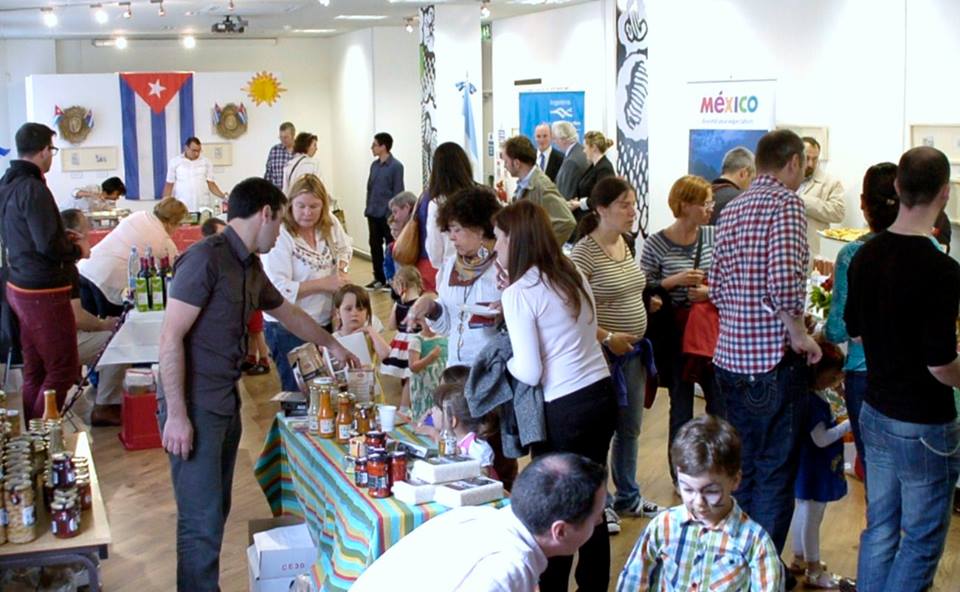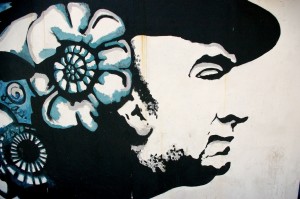Blog del Instituto Cervantes de Dublín
Torre Martello
20 escritores de siete países y miles de historias / 20 Writers from Seven Different Countries and Thousands of Stories
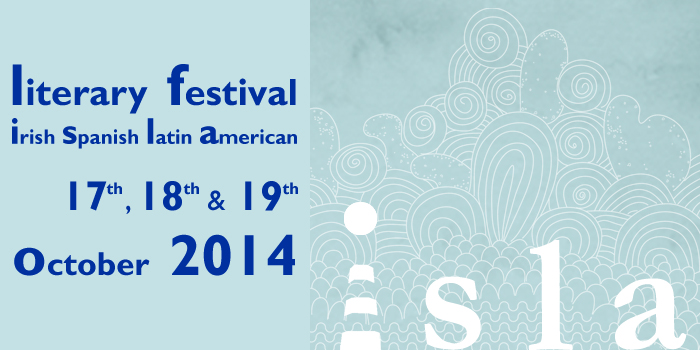
La 3ª edición del Festival Isla de literatura comienza en poco más de una semana. Un festival único en Dublín y en Irlanda. Este año, nuestra «ISLA» (acrónimo de Irish, Spanish and Latin American) recibe la visita de escritores consagrados, prometedores, y la de críticos, traductores y otras personalidades con una fuerte vinculación con el mundo literario de América Latina, España e Irlanda.
John Banville, Premio Príncipe de Asturias 2014, abrirá oficialmente el festival el viernes 17 a las 4 de la tarde y participará en la primera mesa redonda que lleva por título Retratar escribiendo, junto a la vanguardista escritora chilena Diamela Eltit y al multipremiado escritor español José Ovejero. La primera tarde del festival concluirá con el debate «Construyendo identidades» en el que contaremos con la presencia de Donal Ryan, autor de Spinning Heart’s, la poeta y traductora literaria Anamaría Crowe Serrano, y el escritor experimental Christodoulos Makris.
El tema central del sábado, «Nos gustan las historias» comenzará comenzará con la conversación en torno al valor de los cuentos con la presencia de Claire Keegan, el escritor vasco Harkaitz Cano y la poeta irlandesa Mary O’Malley. La segunda mesa redonda del día, «La palabra imprecisa», tendrá como invitados al autor de The Specked People’s, Hugo Hamilton, la poeta gallega Marta Dacosta y el escritor y comunicador irlandés Manchán Magan. Todos ellos abordarán temas como las peculiaridades, ventajas o problemas que supone vivir entre dos o más lenguas. El sábado finalizará con una mesa dedicada a reconocer y repasar el legado literario del gran escritor mexicano Octavio Paz. A esta conversación le seguirá una lectura poética en inglés, español, vasco y gallego.
Pero el sábado no termina ahí porque, especialmente para los interesados en la figura de Gabriel García Márquez y el propio Octavio Paz, la velada continuará con la proyección de los documentales Buscando a Gabo y Vida y obra de Octavio Paz.
El domingo es el día de «Cultura de libros», que comenzará con el debate sobre ficción y realidad en Literaturas enfrentadas con Paul Lynch, autor de Red Sky in Morning, el escritor y comunicador Norirlandés Malachi O’Doherty y el poeta y novelista argentino Américo Cristófalo. Cerraremos el festival con «Acceso a la cultura», con el escritor y comunicador irlandés John Kelly, la directora del semanario El Cultural, la periodista española Blanca Berasategui, y el escritor chileno Waldo Rojas.
Isla es, en definitiva, un festival dedicado a todos los que disfrutan de la lectura, la traducción, la poesía, el cuento y la literatura en general. Un diálogo entre culturas, un encuentro entre tres tradiciones literarias de primer orden y una ocasión inmejorable para acercarse a las letras en español.
¿Dónde?: Instituto Cervantes, Lincoln House, Lincoln Place, Dublin 2.
¿Cuándo?: 17, 18 y 19 de octubre.
Apertura oficial: John Banville, 17 de octubre a las 4 de la tarde.
Entrada libre.
Traducción simultánea en inglés y español.
Texto: Miriam Abuin (prensa) prendub@cervantes.es
The 3rd ISLA Literary Festival sets itself as a unique event in Dublin and Ireland. ISLA (from Irish, Spanish and Latin American) Literary Festival welcomes well known and emerging writers and other personalities with a strong connection to the literary world from these three traditions.
John Banville will inaugurate the festival on Friday 17th at 4pm, and will take part in the first discussion about Portraying Through Writing, in which he will participate with the versatile Spanish writer José Ovejero and the avant-garde Chilean author Diamela Eltit. The evening will conclude with the round table Building Identities with Spinning Heart’s Donal Ryan, poet and literary translator Anamaría Crowe Serrano and the experimental writer Christodoulos Makris.
Saturday’s theme is We All Like Stories. We will commence talking about the value of short stories with Claire Keegan, Basque author Harkaitz Cano and Irish poet Mary O’Malley. In the round table Ambiguous Word, The Specked People’s author, Hugo Hamilton, Galician poet Marta Dacosta and Irish language writer and broadcaster Manchán Magan will discuss the challenges of living in between two or more languages. The last discussion of the day will be dedicated to the cultural and literary legacy of Mexican author Octavio Paz. The panel will be followed by a poetry reading in English, Spanish, Basque or Galician.
For those interested in Gabriel García Márquez and Octavio Paz, they can continue the evening enjoying the screenings of Buscando a Gabo and Vida y obra de Octavio Paz. Both documentaries focus on the personal lives of these Nobel Prize winning writers.
Sunday´s Book Culture will start with the panel about Facing Literatures: Fiction and Non Fiction with the author of Red Sky in Morning Paul Lynch, the Northern Irish writer and broadcaster Malachi O’Doherty and Argentinean poet and novelist Américo Cristófalo. We will close the festival with Access to Culture, with Irish writer and broadcaster John Kelly, the director of El Cultural, Spanish journalist Blanca Berasategui and Chilean writer Waldo Rojas.
ISLA is a multilingual and multicultural event for those who enjoy reading, translation, poetry, short stories, memoirs, travel books or novels. It’s a dialog between cultures, an encounter between these three literary traditions and an incomparable occasion to get close to some of your favourite writers in Spanish.
Location: Instituto Cervantes, Lincoln House, Lincoln Place, Dublin 2
Date: 17th, 18th and 19th October
Opening speech by John Banville, 17th October at 4pm
Free Admission
Simultaneous interpreting available for attendees in Spanish and English
Text by: Miriam Abuin (press officer, prendub@cervantes.es)
Festival Isla 2013, ¿repetimos? / Isla Festival 2013,once again?
Hace poco menos de un mes celebrábamos, en el Instituto Cervantes de Dublín, la segunda edición del Festival Isla de literatura. Ahora te ofrecemos todos los videos de las mesas redondas, las lecturas y las entrevistas que hicimos a los autores en nuestra biblioteca a través de nuestro canal de video.

Quizás te perdiste alguna mesa, quizás vivas fuera de Dublín y no pudiste asistir a ninguna de ellas, quizás quieras aprovechar los vídeos para disfrutar una vez más de la buena literatura, o es posible incluso que seas profesor de español y te interese utilizarlos en tus clases. Porque ya hemos subtitulados muchos de ellos en español. De modo que no hay excusa. Hay mil razones para verlos. Los tienes a tu disposición, mientras nosotros seguimos preparando la tercera edición del festival que se celebrará en noviembre de 2014.
Ahora, por cierto, es un buen momento para hacernos llegar tus sugerencias. ¿A qué escritor te gustaría ver en Dublín?, ¿qué crees que deberíamos cambiar en el festival?, ¿qué podríamos mejorar? Tu opinión es importante. ¡Escríbenos. Ya sabes dónde estamos!
A few weeks ago, we celebrated our Isla Festival of literature at the Instituto Cervantes in Dublin. Now, you can watch all the videos of the roundtable discussions, the literary readings and the interviews we did in our library. They are all available on our video channel .
Perhaps you missed a reading, maybe you live outside Dublin and could not attend any of them , or maybe you want to enjoy once again the taste of good literature. They are good even for practising your Spanish, as many of the videos are already subtitled. So there is no excuse . There are a thousand reasons to see them, while we continue preparing the third edition of the festival to be held in November 2014.
Now, of course , is a good time to send us your suggestions . What writer would you like to meet in Dublin?, what do you think we should improve or change for the next year. Your opinion is important so, write to us! We are more than happy to receive your feedback!
Isla Festival was presented in Madrid last Friday / El Festival Isla de Literatura fue presentado en Madrid
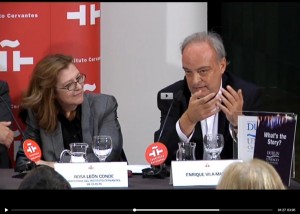 Writers John Banville and Enrique Vila- Matas presented last Friday the Isla Festival of Literature at the Instituto Cervantes in Madrid , an event that will gather in Dublin 16 writers from Spain , Ireland and Latin America .
Writers John Banville and Enrique Vila- Matas presented last Friday the Isla Festival of Literature at the Instituto Cervantes in Madrid , an event that will gather in Dublin 16 writers from Spain , Ireland and Latin America .
The second edition of this festival will be held from the 18th to the 20th October at the Instituto Cervantes in Dublin. Spanish and Latin American literature will be very well represented in Ireland along with the best Irish literature through panel discussions and readings.
As already announced in previous posts on this blog , in the Festival Isla (ISLA is the acronym for Irish Spanish and Latin American) , will participate authors from Argentina , Chile , Cuba , Mexico , Spain and Ireland.
Durin the presentation in Madrid, John Banville recalled the impression of reading in his youth One Hundred Years of Solitude by Gabriel García Márquez , and other Spanish authors , and regretted the lack of presence of Hispanic literature in Ireland. Meanwhile, Enrique Vila- Matas , author of Dublinesca (2010 ) , defined himself as a “literary traveler” who has visited Dublin compulsively (16 times in four years) .
All information about the festival is on our website.
Los escritores John Banville y Enrique Vila-Matas presentaron el pasado viernes en el Instituto Cervantes de Madrid el Festival Isla de Literatura, una cita que reunirá en Dublín a 16 escritores de España, Irlanda y Latinoamérica.
La segunda edición de este festival se celebrará, como sabéis, del 18 al 20 de octubre. A través de mesas redondas y lecturas, la literatura española e hispanoamericana estará presente en Irlanda junto a la mejor literatura irlandesa del momento.
Como ya hemos anunciado en anteriores entradas de este blog, participarán en el Festival Isla (Irish Spanish Latin American Literary Festival), autores provenientes de Argentina, Chile, Cuba, México, España e Irlanda.
En su presentación en Madrid, además de los ya mencionados John Banville y Enrique Vila-Matas, estuvieron presentes los embajadores en Irlanda de Argentina, Chile, México y, cómo no, el embajador de España en Irlanda, Javier Garrigues Flórez.
Banville recordó en su intervención la impresión que le produjo en su juventud la lectura de Cien años de soledad, de Gabriel García Márquez, y de otros autores en español, y ha lamentado la escasa presencia actual de la literatura hispana en su país. Por su parte, Enrique Vila-Matas, autor de Dublinesca (2010), se ha definido como un «viajero literario» que ha visitado «compulsivamente» Dublín (16 veces en cuatro años). Será precisamente sobre los viajes literarios de lo que hablará en ISLA dentro de unos días.
Isla Literary Festival 2013 / Festival Isla de Literatura 2013
 Instituto Cervantes Dublin is pleased to present the second edition of the Isla Festival of Literature.
Instituto Cervantes Dublin is pleased to present the second edition of the Isla Festival of Literature.
This is a unique opportunity to attend a gathering of Irish and Hispanic literature where you will enjoy round tables, readings and other parallel events during three consecutive days. This year, on the second edition of this festival we will have 16 authors from Argentina, Chile, Cuba, Ireland, Mexico and Spain. Poetry, novel, essay, theatre and cinema will be the main characters of a pluralistic program for all audiences.
The ISLA Festival or Irish, Spanish and Latin American Literary Festival is a cultural initiative in Ireland carried out by the Instituto Cervantes Dublin in collaboration with the Embassies of Argentina, Chile, Cuba, Spain and Mexico, as well as Dublin UNESCO City of Literature, Ireland Literature Exchange, Poetry Ireland and with kind support of Dublin City University, Trinity College Dublin, NUI Galway and NUI Maynooth.
Poco más de un mes para que de comienzo el Festival Isla de Literatura 2013. En este festival reuniremos a dieciséis escritores de Irlanda, España y Latinoamérica, tres días consecutivos con mesas redondas, lecturas y otros eventos paralelos. En esta edición, contaremos con 16 autores provenientes de Argentina, Chile, Cuba, Irlanda, México y España. Poesía, novela, ensayo, teatro y cine, serán los protagonistas de un programa plural y para todos los públicos.
El Festival ISLA (Irish Spanish Latin American Literary Festival) es una iniciativa cultural puesta en marcha en Irlanda por el Instituto Cervantes de Dublín con la colaboración de las Embajadas de Argentina, Chile, Cuba, España y México, Dublin UNESCO City of Literature, Ireland Literature Exchange, Poetry Ireland y el apoyo de las universidades Dublin City University, Trinity College Dublin, NUI Galway y NUI Maynooth.
[Video] El Día E 2013: Mi palabra favorita
Todos los años preguntamos a nuestros amigos acerca de sus palabras favoritas en español. Esta vez, cuatro representantes de las embajadas latinoamericanas presentes en Dublín nos dejaron las suyas, con sus diferentes acentos y sus diferentes puntos de vista. Seguro que no las adivinas todas. Te encontrarás con más de una sorpresa.
Una bonita forma de finalizar las celebraciones de El Día E, que esperamos que hayáis disfrutado tanto como nosotros. En nuestra página de Facebook podéis ver la galería de fotos que preparamos para todos vosotros. Quizás te encuentres en ella.
Y así, poco a poco, vamos terminando el curso académico y acercándonos al verano. Durante todo el mes de julio seguiremos aquí, con vosotros, con más actividades culturales, con más cursos, con más biblioteca. Pero recuerda que durante este mes de julio estaremos cerrados los sábados. El último sábado de apertura de la biblioteca y del propio Instituto será el 29 de junio. También estaremos cerrados durante el mes de agosto, así que si quieres llevarte libros para leer este verano, ahora es el momento. Los que te lleves ahora, puedes devolverlos en octubre.
Every year, we ask our friends about their favorite words in Spanish. This time, four representatives of the Latin American embassies present in Dublin gave us their versions, with their different accents and their different points of view. You’ll be surprised for some of them!
A nice way to end the El Día E celebrations. We hope you enjoyed it as much as us. In our Facebook page you can see the photo gallery we prepared for you all. Can you find yourself in it?
So we have nearly finished this academic year and getting closer to summer. Throughout the month of July will be here, with more cultural activities , with more courses, more library . But remember that in July we will be closed on Saturdays. The last opening Saturday will be June 29. We will also be closed in August, so if you want to take books to read this summer, now is the right time. The ones you take now can be returned in October. Have a nice Tuesday!
La biblioteca propone / The library suggests
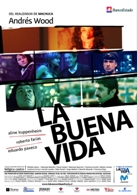
Este mes te ofrecemos dentro de la actividad cultural la tercera edición del ciclo dedicado al cine de Chile que en esta ocasión tiene como tema central el cine y la literatura. De esta manera en la biblioteca dedicamos el tema del mes a la cinematografía de Chile.
Centrándonos en su producción más reciente se habla del nuevo cine chileno como aquel que comenzó en la década de los 60 y se extiende hasta la actualidad. Recibe influencias principalmente de la cultura nacional de la década de los 60, la nueva canción chilena y producciones de otras latitudes, como el Cinema Novo brasileño.
Este movimiento de cineastas chilenos más próximos a la izquierda hay que entenderlo como influencia directa de la realidad social y política del continente americano. La fecha simbólica de su inicio es la primera edición del Festival de Cine de Viña del Mar en 1967 donde se sentaron principios como el de desarrollar una cultura nacional y abordar los diversos conflictos sociales.
La dictadura surgida a partir del golpe de estado de 1973 supuso el exilio masivo de sus cineastas que desde el exilio denunciaron la represión del régimen militar con un tono de nostalgia por la revolución truncada. Cineastas destacados son Miguel Littin, Patricio Guzmán o Raúl Ruiz.
En los últimos años el cine chileno ha vivido un fuerte auge. En el pasado Festival de Cine de Berlín la película Gloriaobtuvo una excelente acogida y su protagonista (Paulina García) obtuvo el galardón a la mejor actriz del certamen. En enero de este año la película Noprotagonizada por Gael García Bernal obtuvo la primera nominación de Chile al Óscar a la mejor película de habla no inglesa. Estos éxitos se deben en gran parte a un sólido programa de políticas públicas que han apoyado la consolidación de una industria de pequeñas dimensiones que se ha profesionalizado gracias a recursos provistos desde el Estado, primero, con la creación del Fondo Audiovisual en 2004, y a partir del 2010, con nuevos instrumentos para la internacionalización del sector audiovisual.
This month we offer you the 3rd Chilean Cinema Season as part of our cultural program. The main theme is the connection between cinema and literature. Therefore the cinema from Chile is our topic of the month in April.
The called New Chilean Cinema is its most recent production. It started in the sixties and it is still present. It was influenced by the national culture of the sixties, the new Chilean song and productions from other latitudes as the Cinema Novo from Brazil.
The majority of Chilean filmmakers were left-wing supporters and they were hugely influenced by the social and political reality of America at that time. In 1967 the first edition of the Cinema Festival of Viña del Mar set the principles: to develop a national culture and approach different social issues.
After the coup d’état in 1973, the new dictatorship meant the massive exile of the filmmakers who from the distance condemned the repression of the military regime with a nostalgic tone for the interrupted revolution. Some remarkable directors are Miguel Littin, Patricio Guzmán or Raúl Ruiz.
In the last few years Chilean cinema is reaching a height. In the last Berlin International Film Festival the film Gloria received praised from the critics and its star (Paulina García) received the Best Actress Award. In January 2013 the film No starring Gael García Bernal got the first nomination of Chile to the Oscar for Best Foreign Film.
This success is partly the consequence of a solid programme of public policies that have supported the consolidation of an industry of small size that is getting a professional character thanks to the resources provided by the Government. The Audiovisual Fund was created in 2004 and in 2010 new instruments for the internationalization of the sector has been promoted.
Exposición: Arpilleras poéticas | Exhibition: Poetic Arpilleras
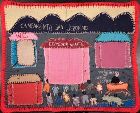 Mañana, día 22, inauguramos nueva exposición gracias a la colaboración de la Embajada de Chile en Irlanda y la Dirección de Asuntos Culturales del Ministerio de Relaciones Exteriores de Chile, los verdaderos motores de esta iniciativa.
Mañana, día 22, inauguramos nueva exposición gracias a la colaboración de la Embajada de Chile en Irlanda y la Dirección de Asuntos Culturales del Ministerio de Relaciones Exteriores de Chile, los verdaderos motores de esta iniciativa.
Arpilleras Poéticas comisariada por la académica y curadora chilena residente en Irlanda del Norte, Roberta Bacic, reúne alrededor de 30 arpilleras chilenas (técnica consistente en la utilización de piezas textiles gruesas y ásperas sobre cuya superficie se realizan trabajos de artesanía y bordado) de diversos tamaños que relatan la historia, la sociedad y la cultura del Chile reciente.
Roberta Bacic a lo largo de los años ha reunido una gran colección de dichas valiosas piezas, dedicándose desde comienzos del año 2000 a su recuperación, conservación y estudio. Ha expuesto a partir del 2008 en Nueva York, Hamburgo, Sao Paulo, Belfast, Barcelona, Berlín, Osaka, Kingston, Londres entre otras muchas ciudades y ahora en Dublín el público tendrá la oportunidad de disfrutar de este arte textil chileno que habla de las vicisitudes del hombre y la memoria.
Puedes visitar la exposición durante el siguiente horario:
Lunes a jueves: 2-7pm. Sábados: 10am a 2pm. Cerrados los viernes, domingos y Bank holidays.
From November 22th to December 15th, the Cervantes Institute, the Embassy of Chile in Ireland and the Cultural Affairs Committee of the Ministry of Foreign Affairs of Chile have the honour to invite you and your family to enjoy the Poetic Arpilleras exhibition of the Chilean academic and curator resident in Northern Ireland, Roberta Bacic. The exhibition will open at 6pm on November 22nd with the curator Roberta Bacic and a poetry recital by Chilean poet Jaime Huenún.
The exhibition “Poetic Arpilleras” gathers around 30 Chilean “arpilleras” (the technique consists scraps of materials hand sewn and appliqued onto burlap. Often arpillera dolls are used to add the three dimensional perspective. Wool is used to sew around the piece, either with a needle or crochet, to give it the shape of a picture to be hung on a wall) of various sizes. These tell about the history, society and culture of contemporary Chile.
Roberta Bacic has gathered throughout many years a vast collection of these valuable pieces devoting time to acquire, recover, conserve and study them since the early 2000’s. She has exhibited from 2008 in New York, Hamburg, Sao Paulo, Belfast, Barcelona, Berlin, Osaka, Kingston and London among many other cities. Now in Dublin, the general public will have the opportunity to enjoy this Chilean textile art which tells the story of human experience and memory.
The exhibition is open during these times:
Mon-Thurs.: 2-7 pm. Sat: 10 am-2 pm h.
Closed Frid., Sun. and Bank holidays
Chile, un país de poetas
Pocos países pueden alardear de ser tierra de poetas como Chile.
Gabriela Mistral y Pablo Neruda, ganadores de sendos premios Nobel de Literatura, ambos poetas; Gonzalo Rojas y Nicanor Parra, galardonados con el Premio Cervantes, son también poetas.
Pero Chile no solo es conocido por sus poetas. Para completar el repóquer de ases ahí está Jorge Edwards, novelista y también Premio Cervantes. Porque Chile también es conocido por ser la tierra de genios de la narrativa, como Isabel Allende o el magnífico Roberto Bolaño.
Otros autores como Luis Sepúlveda, autor de “Un viejo que leía novelas de amor”, Marcela Serrano, con obras como “El albergue de las mujeres tristes” o “Antigua vida mía” y Antonio Skármeta, con una prolífica carrera en la que destaca “Ardiente paciencia”, retrato libre de Pablo Neruda que inspiró la película “El cartero de Neruda” gozan desde hace años del favor del público.
La pasada semana, el Instituto Cervantes de Dublín, en cooperación con la Embajada de Chile en Irlanda, organizó la 2º Semana de Cine Chileno. En este evento se proyectaron varias películas, entre ellas “Promedio Rojo” del director Nicolás López y “El Chacotero Sentimental” de Cristián Galaz. Por todo ello, Chile es durante este mes de marzo el tema destacado en nuestra biblioteca, donde podéis encontrar numerosas obras de artistas chilenos.
Los amantes de la poesía pueden disfrutar de una antología poética de Gabriela Mistral, de los “Cien sonetos de amor” de Pablo Neruda o de la “antipoesía” de Nicanor Parra.
Si lo que os gusta es la narrativa, podéis encontrar en nuestro catálogo “Eva Luna” , “Hija de la fortuna” o “Paula” de la conocida escritora Isabel Allende; “Obsceno pájaro de la noche “ de José Donoso, o “La casa de Dostoesvsky”, entre muchos otros títulos de Jorge Edwards.
Y para los cinéfilos, “Taxi para 3” de Orlando Lübbert; “Los naúfragos” y “La última Luna” de Miguel Littin; o bien “El chacotero sentimental” del ya mencionado Cristián Galaz. ¿A qué esperas?
There are not many countries that can show off about being a land of poets as it happens with Chile. Gabriela Mistral and Pablo Neruda, winners of the Nobel Literary Prize, both poets; or Gonzalo Rojas and Nicanor Parra, winners of the Cervantes Prize and also poets.
But Chile is not only known for its poets, but also because it´s the land of geniuses of narrative literature, like Isabel Allende or Roberto Bolaño. We can also mention other popular writers as for example, Luis Sepúlveda, author of novels such as “The Old Man who Read Love Stories”, Marcela Serrano, “Antigua and My Life Before”, Antonio Skarmeta, prolific author whose novel “Ardent Patience” it is a Pablo Neruda´s free portrait that inspired the movie “The Postman” or Jorge Edwards who combines successfully his career as a writer and as a journalist, he won the Cervantes Prize in 1999.
Last week Instituto Cervantes Dublin organized, in cooperation with the Embassy of Chile inDublin, the Second Week of Chilean Cinema. There were shown several movies like “Promedio rojo” by Nicolás López or “El chacotero sentimental” by Cristián Galaz.
You can find in the library numerous works by Chilean artists, these are some of the titles that are in our shelves:
For poetry lovers you can enjoy an anthology by Gabriela Mistral, you can read “Cien sonetos de amor” by Pablo Neruda or enjoy the “antipoetry” book by Nicanor Parra “Poetry and Anti-Poetry”.
If you want to enjoy narrative, you can find “Eva Luna”, “Hija de la Fortuna” or “Paula”, all by Isabel Allende, “Obsceno pájaro de la noche” by José Donoso or also “El anfitrión” by Jorge Edwards.
The movie-lovers will find “Taxi para 3”by Orlando Lübbert; “Los náufragos” and “La última luna” by Miguel Littin; or “El chacotero sentimental” by Cristián Galaz.
Cine / Film Screening: Gente decente
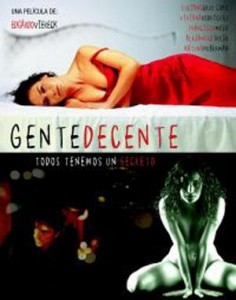 Para finalizar la II Semana de Cine Chileno, hoy proyectamos la película “Gente Decente” del director Edgardo Vierek.
Para finalizar la II Semana de Cine Chileno, hoy proyectamos la película “Gente Decente” del director Edgardo Vierek.
La película trata de un joven y exitoso abogado que está a punto de casarse pero comete un error fatal que lo lleva a verse involucrado en la misteriosa muerte de una mujer al servicio de clientes adinerados.
A tan solo unos días de su matrimonio, y con todas las pruebas en su contra, deberá buscar al verdadero asesino y limpiar su reputación antes de que sea demasiado tarde, viéndose a cada minuto involucrado en un intrincado laberinto que combina el suspense con momentos de intenso erotismo.
Esperamos que hayáis disfrutado de esta semana de cine, y no os perdáis esta última entrega.
To finish the 2nd Chilean Cinema Week we will show today “Decent People” by Edgardo Vierek.
The movie takes place in Santiago. Andrés Barros is a partner at an up-and-coming law firm. He’s getting married, and his friends, including his partner Roberto, arrange a bachelor party where he spends the night with a prostitute, Gloria.
She later shows up at his office and the passion continues, against his better judgment. Soon, Andrés is entangled in sex, lies, videotape, and blackmail. His relationship with Rosario, his fiancée, is strained, he neglects his work, and there’s a dead body in a bathtub. A pimp, a whore, a doorman, a receptionist: where are the decent people?
We hope that you have enjoyed this cinema week. Don´t miss this last movie!
Cine / Film screening: Promedio rojo
La II Semana de Cine Chileno da un salto de género en su tercera entrega con una divertidísima comedia juvenil. Promedio rojo (2004) es una co-producción chileno-española que logró arrastrar a numerosos espectadores chilenos al cine, poniendo una vez más el punto de mira en la producción cinematográfica nacional. Su director, Nicolás López, a sus solo 29 años, está ya habituado a los éxitos de taquilla con películas como Qué pena tu vida (2010) o Qué pena tu boda (2011).
Promedio Rojo es la primera película chilena que emplea efectos especiales digitales para contar una historia donde se cruzan superhéroes, abuelos muertos sacados de La Guerra de las galaxias y dibujos animados que interactuarán con la realidad.
Hoy, 29 de febrero, a las 18h en Café Literario.
The 2nd Chilean Cinema Season drastically moves to a different genre in its third session with this hilarious teenage comedy. Promedio rojo (2004) is a Chilean-Spanish coproduction which made Chilean audiences go en masse to the cinema and put the spotlight once more on the national film making. The director, Nicolás López, at 29, is already in used to box office hits with films like Qué pena tu vida (2010) and Qué pena tu boda (2011).
Promedio rojo is the first Chilean movie to use digital effects to combine cartoon animation with reality, creating a world in which you can see characters of every type imaginable, from superheroes to grandparents, from the deceased to intergalactic heroes you would expect to see in movies like Star Wars.
Today, February 29th at 6pm at Café Literario.
